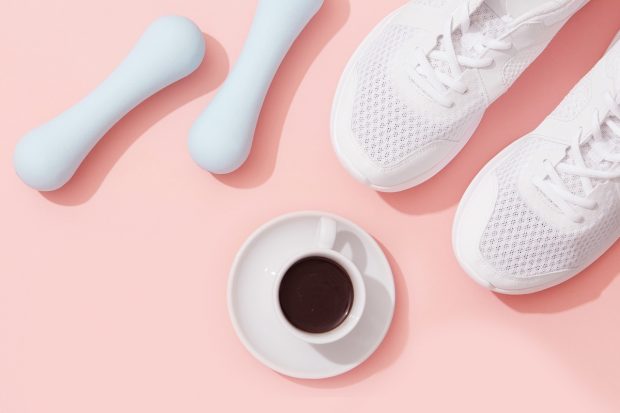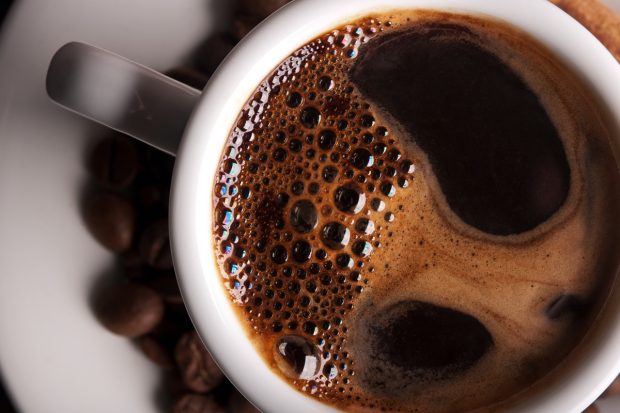Are you a coffee aficionado? Has your caffeine addiction gotten so bad that you need rehab? Maybe not the 12-step kind, but there’s a good chance you’re among the millions who can’t crawl out of bed without your drug of choice—that cup of joe.

Oh, how we love that morning boost of java—the ultimate energy jumpstart to our day. And while every athlete knows a caffeine burst an hour before exercise can drastically improve their performance, what many may not know is that the average joe can benefit from it too.
Gymondo has workouts ready for you once you’re done with your cup of joe. To get started, view them in the app.
Check out the 3 ways caffeine can energize your next workout—and learn how it perfectly complements your fitness plan.
What Is Caffeine?

Caffeine functions as a stimulant, which means your heart rate will increase, more blood flow will be pumped through your body and you’ll get an extra dose of oxygen to your muscles when consumed.
The most common source of caffeine comes from coffee and cacao beans. Historically, coffee and tea have been among the most common ways to consume caffeine. Now, caffeine is being chemically produced and added to a variety of drinks and foods for its physical and psychological powers.
You’re probably already familiar with energy drinks, which fight fatigue and improve physical performance. More and more individuals are consuming caffeine-induced pre-workout drinks to reap the benefits of increased endurance and stamina.
Caffeine Increases Your Endurance

Whether you prefer running in the park or stair climbing at the gym, caffeine is known to increase endurance and may improve your speed.
But if endurance activities aren’t for you, don’t worry. Caffeine also has a positive effect on high-intensity training, since it diminishes feelings of exhaustion and pain. When caffeine is consumed, your body’s glycogen (energy) stores decrease, which forces you to utilize fat reserves as energy. According to research, consuming 2 to 3 cups of coffee an hour before a HIIT workout reduces muscle pain and increases performance.
The takeaway? With the right amount of caffeine, your body may work harder and last longer during exercise.
Caffeine Burns More Calories

Caffeine stimulates the nervous system, which sends direct signals to the fat cells, telling them to break down fat. It does this by increasing blood levels of the hormone epinephrine.
It’s important to note that the release of fatty acids into your bloodstream doesn’t necessarily help you lose fat unless you are burning more calories than you consume. This is where exercise comes into play. Through regular exercise, you can create a negative energy balance, meaning you burn more calories than you take in.
One study suggests consuming coffee before exercise allows you to burn up to 15 percent more calories for 3 hours post-workout. Another study indicates that drinking coffee prior to a workout makes working out more enjoyable.
Caffeine Boosts Your Metabolism
Your metabolic rate plays a crucial role in your weight loss journey. A higher metabolic rate translates to a faster metabolism, making weight loss much easier.
Related: How metabolism changes in your 20s, 30s and 40s
When you regularly consume caffeine, you can boost your resting metabolic rate (RMR), which is the rate you burn fat and calories at rest. So, even without doing anything, you have a better chance of achieving weight loss by consuming caffeine.
With that said, the level of caffeine needed to increase your metabolic rate depends on your age and body type. The effects of caffeine are more effective in boosting metabolism for individuals who are younger and have leaner body types.
The Bottom Line
Timing matters, especially since caffeine takes about 30 minutes to kick in. Therefore, it’s recommended to consume caffeine at least 30 minutes prior to a workout for optimal performance. To date, there are no known studies that suggest the consumption of caffeine is beneficial during training or post-workout.
When it comes to consumption, there is no specific amount of caffeine to ingest, since people metabolize caffeine at widely different rates. For most people, too much caffeine produces adverse reactions—nervousness, distraction and the inability to focus.
While caffeine consumption before a workout can help you power through your training with more endurance and less fatigue, it’s important to be mindful.
Don’t rely on caffeine as the sole answer to fatigue—feeling tired can be a sign of overtraining, lack of sleep or inadequate nutrition. Instead, focus on gaining more energy through activity. The Gymondo app can help with that. But most importantly, always strive for balance.




Kommentar schreiben